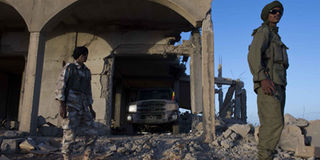7 die in Mali clashes, Islamists threaten to kill hostages

Malian army soldiers man a checkpoint on March 14, 2013 in the northern Malian city of Gao. Clashes between the Malian army and Islamists killed seven people including a soldier and two civilians Sunday in northern Mali's largest city, as Al-Qaeda's north African branch threatened to kill its French hostages. Photo/AFP
What you need to know:
- Fighting in recent weeks has been concentrated in the Ifoghas mountains in the extreme northeast of the country, where French and Chadian soldiers are trying to flush out lingering groups of rebels.
BAMAKO
Clashes between the Malian army and Islamists killed seven people including a soldier and two civilians Sunday in northern Mali's largest city, as Al-Qaeda's north African branch threatened to kill its French hostages.
The fighting in Gao took place as the Malian army carried out what it called a "clean-up" operation in Gao after Islamist militants from the Movement for Oneness and Jihad in West Africa (MUJAO) infiltrated the northeastern city and opened fire on an army camp overnight.
Al-Qaeda in the Islamic Maghreb (AQIM), an allied extremist group, for its part renewed a threat to kill its French hostages and called on their families to pressure France's government to end its military operation against radical Islamists who had seized control of northern Mali.
The Al-Qaeda franchise is currently holding at least five French hostages in the region. It announced last week that it had killed a sixth, business traveller Philippe Verdon, though Paris has not confirmed the report.
The hostages are "very much alive, except for the spy Philippe Verdon", the group said in a message published on Mauritanian news site ANI, which often carries statements from Islamist groups.
"However, we cannot guarantee they will remain alive indefinitely, because of your government's aggression and your army's attacks against mujahedeen bases," it added.
"We recommend the hostages' families and the French people pressure President (Francois) Hollande and his government to withdraw their army from Mali."
The group condemned what it called an "unjust occupation" by France, saying it risked "transforming all of Africa into a swamp in which the French will drown."
In Gao, a Malian military source said the army was "carrying out a clean-up to dislodge any Islamists that may have infiltrated" the city, downplaying the significance of what MUJAO claimed was an attack on an army camp in the city.
"Some individuals fired three AK-47 shots at a Malian military camp in Gao overnight," the source said.
"Our men responded forcefully. We see it as a very minimal incident. You can't even call it an attack."
During the clashes that followed, a Malian soldier, two civilians and four Islamists were killed in exchanges of gunfire, an African security source told AFP in Gao.
The city was now "calm" again, the source said, adding that the army, "backed by French and African troops, had the situation under control".
A Malian military source confirmed the toll from the clashes.
"The mujahedeen are going to continue fighting until the final victory," said Oumar Wahab, a MUJAO leader who was one of the city's rulers during the months that Al-Qaeda-linked groups controlled northern Mali, implementing a harsh version of Islamic law.
The Islamist militants were chased from Gao by a French-led military operation launched on January 11 to reclaim Mali's vast desert north after a 10-month occupation.
The city was hit by several suicide bombings and guerrilla attacks in the following weeks, and Islamist fighters have continued to clash with French and African forces in the surrounding area.
Mali descended into chaos in the wake of a March 2012 coup, as Al-Qaeda-linked rebels capitalised on the power vacuum to seize a Texas-sized triangle of desert territory in the north.
Fighting in recent weeks has been concentrated in the Ifoghas mountains in the extreme northeast of the country, where French and Chadian soldiers are trying to flush out lingering groups of rebels.
In one of the most significant successes yet of its intervention, Paris confirmed on Saturday that one of the key leaders of AQIM, Abdelhamid Abou Zeid, had been killed in fierce fighting with French-led forces in the Ifoghas late last month.
"I'm happy about his death," Malian Foreign Minister Tieman Coulibaly told journalists Sunday at a press conference in Bamako with visiting German Cooperation Minister Dirk Niebel.
"I want all the leaders of AQIM and all the terrorist leaders to be destroyed."
Algeria's Ennahar TV reported later Sunday that Abou Zeid has been replaced by 34-year-old Algerian Djamel Okacha, also known as Yahia Aboul Hannam,
According to the channel's boss Mohamed Mokkedem, Okacha is a close aide of AQIM chief Abdelmalek Droukdel who oversaw operations in southern Algeria and northern Mali and is considered the "real leader" of the group.
Paris has said it hopes to begin the withdrawal of its roughly 4,000 troops in Mali from the end of April and hand over responsibility to Malian troops and an African stabilisation force.




